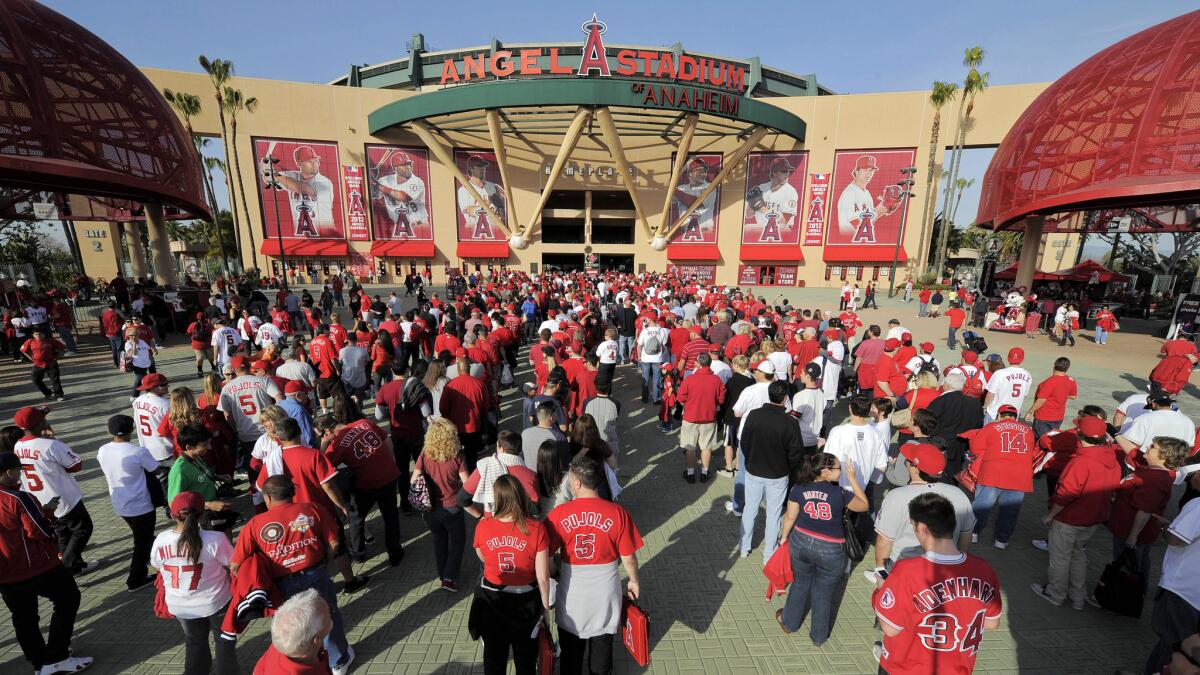Tustin wants Angels, but who pays for the ballpark?

As the city of Tustin affirmed its interest in pursuing the Angels, the city manager said Tuesday that the city would not contribute to a stadium deal without a mechanism to recoup its investment.
Four days after the Angels walked away from stadium negotiations with the city of Anaheim, the Tustin City Council met behind closed doors for 2 1/2 hours Tuesday night to discuss how to proceed. City Manager Jeffrey Parker did not hesitate to identify the biggest question for the city.
“For us, it’s how the financing would be put together to make this happen,” Parker said.
The Angels’ proposed deal in Anaheim collapsed over whether the city should let the team lease the stadium parking lot for $1 per year and retain revenue from development, with the first $150 million of profits used to recoup the Angels’ estimated cost to renovate Angel Stadium.
In Anaheim, an appraiser valued the land in question at $225 million. Parker said the Tustin land could be worth a similar amount and said the city would expect to make back that amount on any land provided to the Angels, most likely from lease payments or a share of development profits.
“We want to protect that $200 million,” Parker said. “We want a rate of return on that land value.”
In March, consultant Dan Barrett told the Anaheim City Council that a new ballpark could cost $600 million to $700 million, although Anaheim Mayor Tom Tait said that figure could approach $1 billion if costs for land acquisition and infrastructure were included.
Angels owner Arte Moreno told The Times last week that the Angels “can afford to build a new stadium,” although team spokeswoman Marie Garvey said the team would prefer to seek “a public-private partnership.”
Tustin Mayor Al Murray, who said in February that the talks with Tustin “could be a leveraging opportunity” so Moreno could put pressure on Anaheim, declined to comment Tuesday. Parker said the Angels have told him privately what they have said publicly – that is, that they are looking at all their options.
“I think they’re seriously looking at us,” Parker said.
On Friday, the Angels walked away from a deal framework – called a memorandum of understanding (MOU) – with the city of Anaheim. However, the Angels are expected to renew discussions with Anaheim.
“They could go in and get another MOU tomorrow,” Parker said.
The proposed Tustin stadium would be located at the former Marine Corps air station, with proximity to Interstates 5 and 405 and Highways 55 and 261. Parker said the Angels had noted the adjacent Metrolink station could deliver fans directly from the Inland Empire.
Two Tustin residents spoke against the proposed stadium at Tuesday’s meeting, citing concerns over traffic and potential taxpayer liability. No one spoke for the stadium. City Attorney David Kendig said the public would have multiple chances to comment “as the process moves forward.” Any deal with the Angels would be “a long ways off,” Parker said, and would be subject to public disclosure and debate.
The Angels can opt out of their Anaheim lease from 2016 to 2019. They have insisted they would be called the Los Angeles Angels under any new stadium deal, a point that has rankled Tait but did not appear to bother Parker.
“I’m not sure that is going to be a big deal to Tustin,” Parker said. “It’s still going to be the home of the Los Angeles Angels.”
More to Read
Go beyond the scoreboard
Get the latest on L.A.'s teams in the daily Sports Report newsletter.
You may occasionally receive promotional content from the Los Angeles Times.











